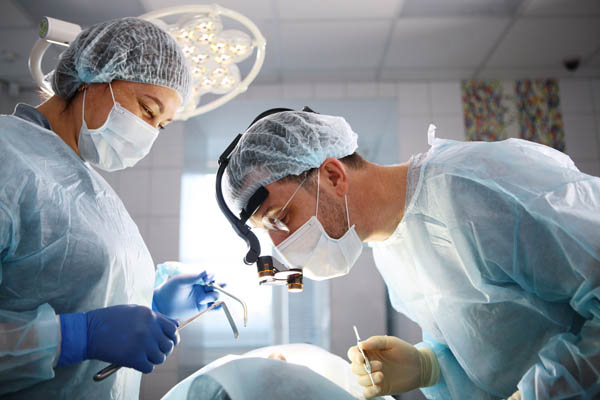Pros and Cons of Bone Grafting

A bone grafting procedure can be used to fix issues that develop with the joints and bones. In dentistry, it is usually used to restore lost bone tissue in the jaw. A number of patients have to get such a procedure to be eligible for implants.
Bone grafting involves transplanting bone tissue from another part of the patient's body or an external source and using it to fix damaged bone tissue. It is used to fill up areas where extra tissue is needed.
Why bone grafting is performed in dentistry
Bone grafting can be performed for a variety of reasons. As far as dentistry is concerned, it is mostly used to bolster up a patient's jawbone tissue so it can hold implants in place. Implants are a popular way to replace missing teeth as they replace both the lost tooth and its root.
Dental implants help to prevent the bone tissue loss that is associated with missing teeth. Those who have failed to replace a missing tooth for a while are likely to have diminished jaw bone density. This can disqualify them from getting implants without first getting a bone graft.
Different types of bone grafting
These are two of the common types of bone grafts used nowadays:
1. Allograft pros and cons
This involves using bone from a deceased donor that has been processed and kept in a tissue bank. Allografts are often used for major bone grafts as are needed for procedures like knee and hip reconstruction.
The technique reduces the risk of infection since an additional surgery is not needed to extract grafting materials. The risk of rejection is also reduced because the source material has no living cells. There is no need to match the patient's blood type with the donor's.
However, some patients are not comfortable with the idea of getting bone tissue from a cadaver. In addition, allografting does not promote the growth of bone tissues, and it can be less accessible than other types of bone grafts due to limited supply.
2. Autograft pros and cons
In an autograft procedure, the bone tissue is harvested from a healthy part of the patient's body like the wrist, pelvis, wrist or ribs. Factors like the patient's health and the location of the bone graft often determine the type of bone grafting the dentist decides to perform.
There is no risk of rejection since the source material is taken from the patient's body. It can promote the growth of the patient's bone tissue. Plus, the bone grafting materials are easily accessible, being taken from the patient.
There are some downsides, however. The patient will have to get an additional operation. It can make recovery more painful since there are multiple surgery sites. As well, since grafting materials have to be taken from the patient's body, it is not ideal for major grafting procedures like the rebuilding of a long bone.
Need a dental bone graft?
Bone grafting can help restore your jaw bone. Call or visit our clinic to learn more about this surgical procedure that can make you eligible for implants.
Get started today…
Request an appointment here: https://www.brightonspecialtydental.com or call Brighton Specialty Dental Group at (805) 644-5284 for an appointment in our Ventura office.
Check out what others are saying about our services on Yelp: Read our Yelp reviews.
Related Posts
A dental crown and a bridge both restore smiles, but they solve different problems and follow different procedures. Many patients ask which option is best when a tooth breaks, cracks, or goes missing. Typically, a general, cosmetic, or family dentist would repair a tooth with a crown but replace a missing tooth with a bridge.…
Metal braces have long been the expected option for correcting misaligned teeth, but the introduction of Invisalign® treatments has many dental patients rethinking the choice. There are many reasons to choose a clear aligner system over metal wires and brackets to achieve a uniform smile and straighter teeth, but the decision is ultimately up to…
Dentures restore chewing power and an aesthetically pleasing smile, but the right food choices help everything feel natural. During the first few days, soft textures build comfort while you can learn new habits. With simple techniques and smart options, eating with dentures becomes easy and enjoyable. Here are some examples of what denture wearers can…
Choosing between dental bonding and porcelain veneers becomes easier when a cosmetic dentist outlines the benefits, limitations, and long-term value of each option. Many adults today seek smile enhancements that are both natural-looking and durable, but understanding which treatment best fits specific goals can feel overwhelming without professional input. A cosmetic dentist considers factors such…
